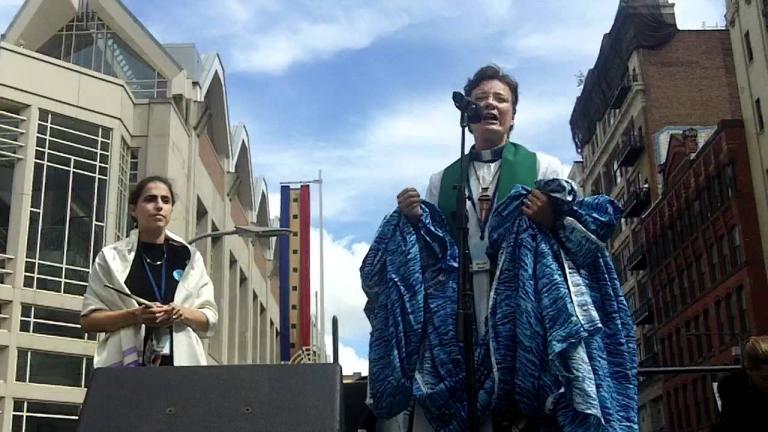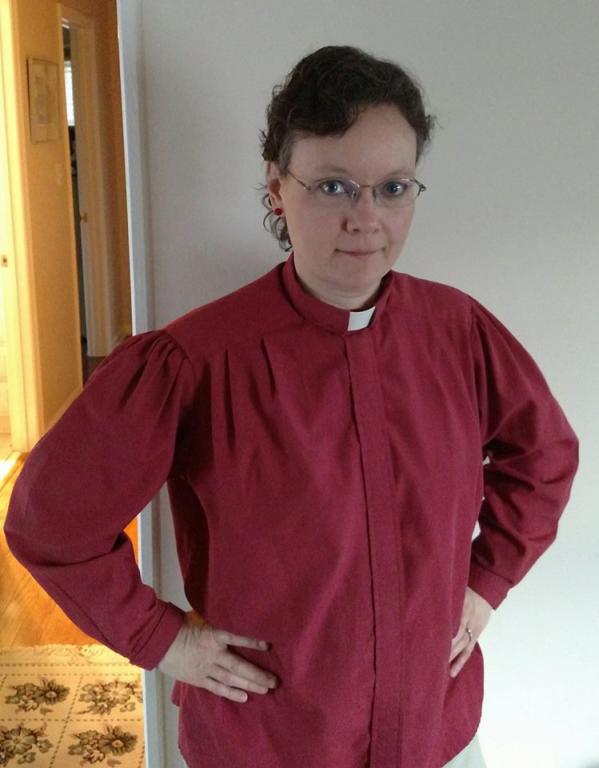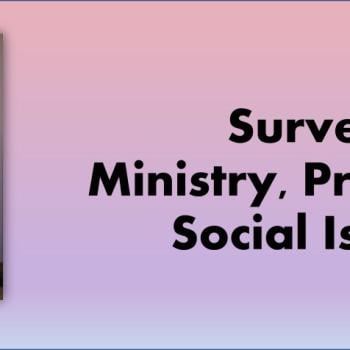So your church has a pastor – who just happens to be female. Congratulations! Given that many denominations and individual churches still do not allow females to be ordained clergy, the fact that your church has accepted a female pastor is cause for celebration.

Inadvertent sexism
But despite your best efforts to be supportive of your female pastor, it’s likely that some in your church (and maybe even you yourself) have said or done things that have been hurtful, undermined her authority, or subtly cast aspersions on her leadership. After 17 years as an ordained Lutheran (ELCA) minister, and as a seminary professor mentoring female students, I’ve learned that women in ministry face challenges that are different than their male colleagues.
So I began asking: What are some of the sexist things parishioners have said or done to you as a female in ministry? Maybe they were not intending to be sexist. Maybe they actually thought they were complimenting you or “helping” you by giving you “feedback.” But what they said left you feeling uncomfortable, annoyed, or even angry.
Here is what they shared:
- “For such a tiny little woman, you have a lot of energy!”
- On first meeting me: “Are you married? What does your husband think about this?”
- “You are the prettiest pastor I’ve ever met.”
- You are “articulate and attractive” said my ex-senior…as compared, of course, to my male associate who is “brilliant, intelligent.” I’m thinking I should have been a TV anchor instead of a pastor!
- “You should be wearing stockings or pantyhose.” (And I am in robe down to mid-calf.)
- After worship and I had taken off my robe, I was helping a woman get into the chair lift to leave the building. One of the elder men came up to me and said, “From this angle, I can see what you’re all about in your dress.”
- 90% of what was said to me as a pastor involved my attire. “That’s not how a minister should dress,” and that sort of thing. My personal favorite was, “First we hire a woman and then she wears pants!”
- I’ve been told that maybe I should wait until after my kids leave the house to pursue ordination.
- “You’re nicer to look at than the male senior pastor.”
- I can’t even begin to count the number of times I was told “that isn’t how a minister should dress.” When I pushed back, asking, “And how do you think I should dress?” they couldn’t come up with a significant answer. Because in their minds, a minister wears a tie.
- My senior pastor actively fought against my receiving a raise that would put my pay scale in line with our synod guidelines. I had to go over his head to the board to advocate for myself.
- “You can’t be old enough to be a pastor!” (I’m 42).
- “I just can’t ever see you being a senior pastor.”
And this little gem was written about me by a congregant: “Does she want to be a pastor, a parent, or an activist? She needs to get her priorities straight.”

Sigh. For the most part, these are all nice, well-meaning people. But they reveal just how far we have to go until female ministers are treated with the same respect as their male counterparts.
Pastoring while parenting
Female pastors with children also noted how difficult it was to balance their roles as parents and clergy, especially during worship. One woman shared:
“I struggled with how to handle the supervision of my children when they were still little and at the church on Sundays and my husband was not around. People didn’t seem to know it might be good to lend a hand. (When she was seven or so, my older daughter almost choked on a Life Saver one Sunday in worship while I was preaching… finally a woman got up and helped her to the bathroom.) That was where I often found tension within myself… two different roles, both important, and they were in conflict at that moment.”
Another female pastor concurred:
“The thing with helping out with your kids is so infuriating because we all know if it was a male pastor whose wife was out of town or something, everyone in the church would be clamoring to help him and the children. AND it would be accompanied by, ‘Oh, poor Pastor Jimmy having to babysit his kids while his wife is out of town.’”
There are consequences
Speaking personally, parenting while pastoring has left the sorest spots on my ministry. Not only did I receive criticism of my parenting, so did my husband. It got so bad at one point my husband and kids had to take a break from the congregation for a few weeks. We decided they would worship elsewhere since we had been told how distracting our kids were during worship. My feeling was, “You can criticize me all you want, but when you go after my husband and kids, all bets are off.” Only a handful of people actually said hurtful things, but it was so biting.
After my husband and children weren’t in church for several weeks and people asked why, I told them the truth – that my family didn’t feel welcome, so they were on a break. The response was overwhelming – apologies, tears, genuine remorse. I learned that sometimes people need to see the consequences of their actions rather than me just accommodating and making excuses for their behavior.

IF-WAM
As you interact with your female pastor, there are some things you’ll want to keep in mind so that you don’t inadvertently perpetuate sexist stereotypes or treat her differently than her male counterparts. Of course, this is not a complete list. But these are drawn from my own experiences, and my conversations with female clergy colleagues, as well as students where I serve at Lexington Theological Seminary.
As a general rule of thumb, remember IF-WAM. Before you say something or make a comment or find yourself thinking certain things about your pastor, ask yourself:
IF (name) Were A Man, would I say, do, think or this?
In other words, if you’re thinking of saying something about your female pastor’s appearance – stop, and ask yourself – would I say the same thing if this were a male pastor? If you wouldn’t, then don’t say it to your female pastor either.
Top Ten Things Never to Say to Your Female Pastor
[And see the follow-up piece: 7 Ways Your Church Can Support Your Female Pastor]
-
Avoid commenting on – either complimenting or criticizing – your pastor’s appearance. This includes her body, her face, her make-up, her clothes.
Better: Give supportive feedback about the work she has done, a task she has accomplished, or a goal she has achieved.
-
Avoid making comparisons between pastors based on gender differences.
Better: Ask how your church can be supportive of your female pastor’s goals for leadership development and continuing education. And then listen to what she says.
-
Avoid falling into the gender wage gap with your female pastor.
Better: Do the research to find out what male pastors in your area are making at the commensurate length of service. Make sure your female pastor’s salary meets standard guidelines.
-
Avoid making assumptions about your pastor’s long-term career goals. They may not want to remain as the Youth Minister or Child and Family Minister or Associate Minister forever.
Better: Ask your female pastor how your church can help with questions of discernment and God’s call, so that the Church can best be served by your pastor’s gifts and skills. And then listen to what she says.
-
Avoid commenting on your pastor’s marital status. Don’t ask questions. Don’t be nosy, even if you mean well.
Better: Ask how your church can be supportive of your pastor finding time to develop healthy social relationships outside of the congregation. And then listen to what she says.
-
If your pastor has a spouse (male or female): avoid commenting on the state of the marriage.
Better: Ask how your church can help create sabbath time for the pastor and her spouse to build and strengthen their relationship. And then listen to what she says.
-
If you pastor has children: avoid commenting on her (or her spouse’s) parenting.
Better: Ask her (and her spouse) how the church can be most helpful in supporting them as they juggle the role of parent and pastor/pastor’s spouse. And then listen to what she/they say.
7A. If your pastor does not have children: avoid insensitive comments about her being childless (like “You’ll understand when you have children.” Or “When will we be throwing you a baby shower?”)
Better: Since you have no idea if your pastor wants children, is trying and unable, had a miscarriage, etc., it’s not your place to comment. So simply be supportive and encouraging of the family she does have.
-
Avoid setting up your pastor with the “Super Woman” syndrome, expecting her to do everything – pastoring, parenting, marriage, friendship, cooking, math, guitar-playing – at the highest levels of expertise.
Better: Ask your pastor if she feels she is receiving enough support for the areas of her life that are most important. And then listen to what she says.
-
Avoid the fear of offering valid critiques because you’re afraid your female pastor is too fragile, too sensitive, or too emotional.
Better: If you have a suggestion, a grievance, or what you think could be helpful feedback, ask to meet with her to share it. Instead of criticizing her as a person, keep your focus on the work, the betterment and growth of the church, and how you or the leadership can help support her in the changes that are needed.
-
Avoid comments and actions that denigrate, demoralize, cut down, or otherwise undermine your female pastor.
There’s no “better” here. Just stop saying and doing those things. You’re a Christian, remember?
Worthy of the call
Share these tips with your fellow church members, your senior pastor, your church staff members, your family members, the older congregant who “doesn’t know better,” and, yes, your female pastor.
Let’s support our female pastors – they are called by God. Together, we can all live our lives “worthy of the calling we have received,” (Ephesians 4:1).
[For the “sequel” to this list, see: 7 Ways Your Church Can Support Your Female Pastor]

Leah D. Schade is the Assistant Professor of Preaching and Worship at Lexington Theological Seminary (Kentucky) and author of the book Creation-Crisis Preaching: Ecology, Theology, and the Pulpit (Chalice Press, 2015).
You can follow Leah on Twitter at @LeahSchade, and on Facebook at https://www.facebook.com/LeahDSchade/.
Clip art graphic created by Leah D. Schade.
For more of Leah’s posts on women and religion, feminism, and gender, check out these links:
#MeToo, #ChurchToo: The Church is Facing the Truth About Its Sexism
7 Ways Your Church Can Support Your Female Pastor
Words of Advice for Good Men: #MeToo Meet #YouToo
Jesus, Mother Hen: This is the God I Want to Worship
The Case for Recognizing Mother’s Day in Church













